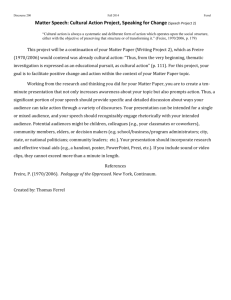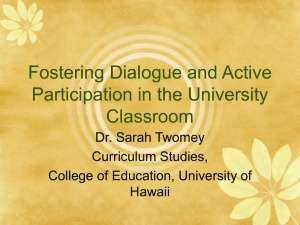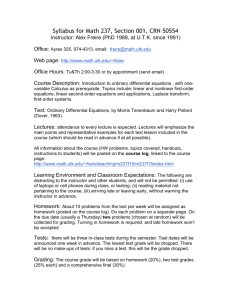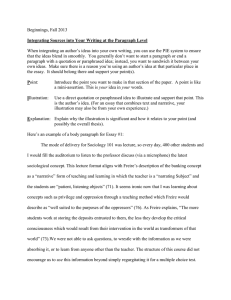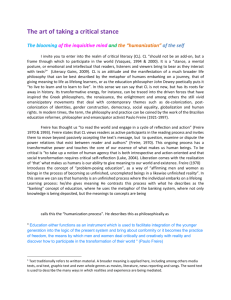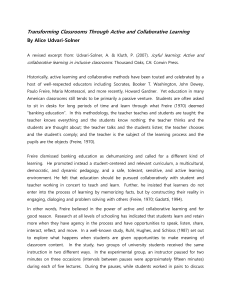Popular Education and Systematisation
advertisement
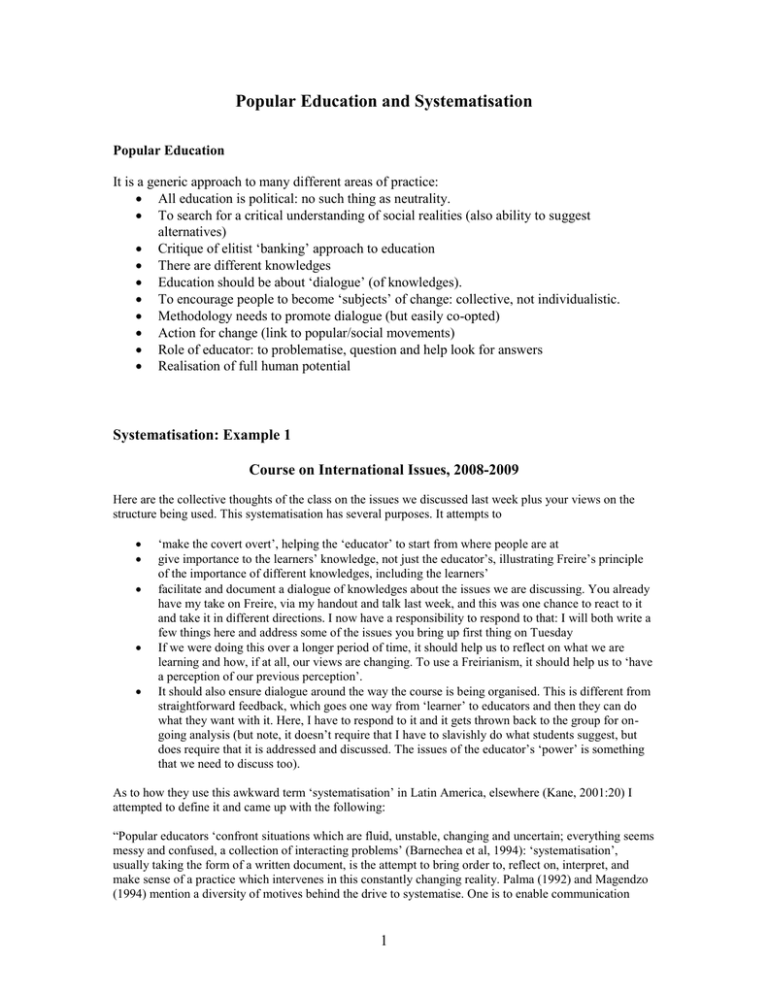
Popular Education and Systematisation Popular Education It is a generic approach to many different areas of practice: All education is political: no such thing as neutrality. To search for a critical understanding of social realities (also ability to suggest alternatives) Critique of elitist ‘banking’ approach to education There are different knowledges Education should be about ‘dialogue’ (of knowledges). To encourage people to become ‘subjects’ of change: collective, not individualistic. Methodology needs to promote dialogue (but easily co-opted) Action for change (link to popular/social movements) Role of educator: to problematise, question and help look for answers Realisation of full human potential Systematisation: Example 1 Course on International Issues, 2008-2009 Here are the collective thoughts of the class on the issues we discussed last week plus your views on the structure being used. This systematisation has several purposes. It attempts to ‘make the covert overt’, helping the ‘educator’ to start from where people are at give importance to the learners’ knowledge, not just the educator’s, illustrating Freire’s principle of the importance of different knowledges, including the learners’ facilitate and document a dialogue of knowledges about the issues we are discussing. You already have my take on Freire, via my handout and talk last week, and this was one chance to react to it and take it in different directions. I now have a responsibility to respond to that: I will both write a few things here and address some of the issues you bring up first thing on Tuesday If we were doing this over a longer period of time, it should help us to reflect on what we are learning and how, if at all, our views are changing. To use a Freirianism, it should help us to ‘have a perception of our previous perception’. It should also ensure dialogue around the way the course is being organised. This is different from straightforward feedback, which goes one way from ‘learner’ to educators and then they can do what they want with it. Here, I have to respond to it and it gets thrown back to the group for ongoing analysis (but note, it doesn’t require that I have to slavishly do what students suggest, but does require that it is addressed and discussed. The issues of the educator’s ‘power’ is something that we need to discuss too). As to how they use this awkward term ‘systematisation’ in Latin America, elsewhere (Kane, 2001:20) I attempted to define it and came up with the following: “Popular educators ‘confront situations which are fluid, unstable, changing and uncertain; everything seems messy and confused, a collection of interacting problems’ (Barnechea et al, 1994): ‘systematisation’, usually taking the form of a written document, is the attempt to bring order to, reflect on, interpret, and make sense of a practice which intervenes in this constantly changing reality. Palma (1992) and Magendzo (1994) mention a diversity of motives behind the drive to systematise. One is to enable communication 1 between organisations and educators so that each may learn from the other’s experiences, successes, problems and failures; another is to help a group of educators analyse and evaluate their own work; a third is a deliberate attempt to use systematization as part of the educative process, where writing down and interpreting developments is part of a conscious effort to help a group reach new levels of understanding. Crucially, though, the concept of systematization is not of dispassionate, detached, ‘neutral’ report-writing: those who collectively engage in systematization are also, unashamedly, part of the focus of enquiry, both ‘subjects’ and ‘objects’ at the same time. Jara emphasises that systematization should not simply be about narrating, describing and classifying events but should pay attention to ‘the interpretation which “subjects” give to these events so that a space is created in which these interpretations are discussed, shared and challenged’ (Jara, 1994b:24).” Class 1, Tuesday 4th November: the Ideas of Paulo Freire A: Thoughts on Issues Discussed 1. 2. 3. 4. 5. 6. 7. 8. 9. 10. 11. 12. 13. 14. 15. 16. 17. Nice idea of reciprocal learning/teaching – agreed with a lot of Freire’s ideas – some maybe not so much- educators should be neutral Very interesting, good introduction – agrees with my left-leaning politics – enjoy discussion Surprised @ some of the group discussions – need to be able to widen my own views towards those who disagree with the political basis of education – need to understand why people don’t think education is political I thought the issues discussed today were very interesting but I would have preferred to read up the lecture notes beforehand Very interesting – would like to go and digest the key points – Definitely interested in finding out out/learning more – felt my social conscience moving Would be good to see examples of how Freire’s ideas have been used in Scotland or European countries Keen to read around the subject – quite a lot to take in and will enjoy going through it again before next week – would have like this subject to have been introduced before now – would have found it useful nearer the beginning of the course The ideas are interesting and to look at how they apply to wider situations – you might not have thought was not relevant Very interesting and would like to know more about popular education in Latin America I think that what we’ve discussed tonight may be relevant to my placement in an area of deprivation. It has been really interesting to find out more about Latin America. I thought the lecture on Freire was interesting, particularly the background on South America. Obviously, this is my first introduction to Freire and it would have been useful to have read some background. I feel Freire is an educator who is against oppression. Possibly due to his Marxist and humanist influences. The issues are new to me and I found they made med think about other countries’ education development – some parts were different from what I thought I have been very taken with the ideas of Freire. From what I have learned I believe the theories at this initial stage are sound and will undertake more study relating to Freire. However, the ideas may be slightly utopian. Again, transfer of theory to practice may be problematic. I thought it was really interesting and I’d like to read a lot more on this subject. Really liked the balance in terms of discussion/lecture, mixing with different students etc. Quite a lot of ideas here that I align with and use in my own teaching practice – interesting. Very interesting – I’m pretty sure I agree with the ideas but not sure I understand it enough! I want to see how these ideas could be put into practice in different educational situations – I’m not sure how I could carry these ideas with my classes Initial thought is that on the basis of principle of “oppression” Freire would side with FEMINISM. He seems not to from my limited reading. Is that thecase? Good/positive – learned a lot of interesting things about local knowledge – about oppression – action etc 2 18. It has brought different views on what would happen if Freire methodology is used in education – this would effect people, especially in a political society – I agree with how he says that when teaching participation should be involved and develop what they have learned. 19. Interesting issues, agreed with most of the issues discussed – thought that he had some good ideas – I like the fact that Banking Education is not good – I think that primary school teaching is still very much banking education. Also to help the oppressed realise they are oppressed – this could be a good thing but may require a bit more thought – overall I agreed with most of these ideas 20. Very interesting the idea of “teaching to change the world” – fantastic the work with the oppressed 21. A good range of issues discussed – interesting geographic overview which is helpful to me being geographically challenged! – would be good to hear more about Augusto Boal and a viewing of some of the stuff would be good – the Paulo Freire discussion was interesting and makes me want to return to some of the works and read up on them again 22. Paulo Freire is “unique” in his thoughts and ideas about education – interesting lecture on the history of Latin America and its education system – I’m interested in reading more about Paulo Freire and his work 23. Well, the issues surrounding Freire are almost identical to the issues surrounding my own desire to educate; personal and social change; I do, however, feel the emphasis is on basic education rather than on giving our students credit ie: I believe we can discuss social change with our students whilst discussing Shakespeare or Toni Morrisson or Plutarch. For instance, I once made someone cry by letteng them read ‘fight club’ & ‘Jonathen Livingstone Seagull’??! 24. Very interesting – so far fairly in agreement with his thoughts – however I still question whether the perspective of the teacher is ever stable and if, for that matter, the learners 25. Provoking – liked how discussion often (but not always) resulted in consensus – need more time to absorb his ideas 26. I find some of the propositions simplistic (ie ‘the world is unjust’) and (‘all education is political’) but nevertheless I found the subjects and the way they were delivered by the lecturer very engaging. I find the idea of education as a tool to end injustice/oppression quite a dangerous one, but would like to find out more. I agree that all education is ‘dialogue’ – an idea that stems from the Greeks. I also like the idea of learners becoming the agents of change and taking ownership of their own learning journey. 27. Freire’s thought on acknowledging what people know and integrate into your education method/style was appropriate (taking the example of noisy traffic lights for the blind) – promoting dialogue encourages people to question their position/situation and hopefully do something about it. 28. Very interesting class – wonder about what education does for the oppressed – does it worry the ruling powers or elite? How does it affect third world countries? Are there similarities here? What progress has there been made by Freire’s work? Does it work and would similar teaching work here? Do all teachers know their style of teaching and are they aware of its consequences? Tutor’s Response Someone says educators should be neutral: Freire says this is impossible. I’ll try to bring an example to class and see if we can push this a bit further. I’m sorry you weren’t able to read anything beforehand. I wasn’t aware that last week’s reading was turned off, mainly because I wasn’t even aware Moodle had that facility. You suffered but I have learnt my lesson! See the Kirkwood book for Freire in Scotland (also the Crowther et al book on popular education and social movements in Scotland today) RE Freire and feminism: to my knowledge he didn’t write much on it - he did discuss it in a book of conversations with the north American Ira Shor - except to say that he accepted feminist critiques of his earlier work and that feminists had educated him about the oppression suffered by women. His later writing shows a lot more sensitivity to the issue of gender, he provoked profeminist discussions around what should be the appropriate word to use in Portuguese for a female teacher and many feminists have taken inspiration from his general educational method. We’ll be doing some of Boal’s stuff on Tuesday 3 Freirian ideas should be relevant to all educational endeavours, not just basic education (the examples of Toni Morrison etc seem very appropriate). When someone says ‘I find the idea of education as a tool to end injustice/oppression quite a dangerous one’, I’m not sure I understand what is meant by that. Does it work and worry elites etc? Good question and difficult to answer, mainly because there are so many variables involved. It has clearly worried elites at times but it also overlaps with so many other areas of activity – like campaigning, for example – and the ideas are used in so many different ways, and in so many different contests, that it probably depends on how you would measure whether or not it was working. I mentioned an example from Haiti which worked spectacularly well – I’ll give more details this week – but equally, it might have backfired. B: Thoughts on Course Structure 1. 2. 3. 4. 5. 6. 7. 8. 9. 10. 11. 12. 13. 14. 15. 16. 17. 18. 19. 20. 21. 22. 23. 24. Good structure – group work, interacting in class – balance of lecture/discussion good Good introduction, like discursive elements – enjoy this approach to education as I feel as though I actively interact with the topic Good – need more time for discussion The structure of the course was very good, very laid back and I felt that it was a good ice-breaker at the start – the lecture went fast because it was interesting Good context, geography etc – good personal experience + examples – has info only 2 weeks – would love more but appreciate the constraints Good to discuss in small pairs then into groups – lecture input was just right in regard to timing Really thought the non ‘ice-breakers’ at the beginning were very useful – thought that the balance was good between lecture and questions etc – enjoyed the musical interludes! Balance of teacher information and discussion fine. Group work stimulated interesting conversation I thought the balance between lecture and activity was good It was good. The initial exercises were interesting as was the lecture and handout on Freire. Special way to start the class very interesting! Excellent structure – too much lecturing generally leads to me losing interest – being in different groups as opposed to the same group was excellent Fine Good balance of activity and lecturing – the last discussion (views of Freire) could have been slightly longer and more directed (some questions to discuss?) – for many people it was the first time hearing these views Structure is different from norm, but as a result of that challenging because it takes us out of our “comfort zone” Good/no slides – good group work – learned a lot from talk- maybe a bit too long, ¾ of length maybe I have found the course structure very interesting – made me understand Paulo and brought awareness as to how using his theory can affect people Enjoyed the structure but would have liked to have been able to read something about it before the class – look forward to next week Very interesting the way you induced the dialogue between us (learners) but also very interesting the (then a wee diagram inserted which I can’t reproduce, of the chairs arranged in a horseshoe) “ex catedra” part of the class. I think it’s a good balance and it’s really good to see some of the ideas put into practice. I like the mix of dialogue and info-giving. The course structure was good tonight – well thought-out ideas for discussion – good “food for thought” for next week Would have preferred more of a lecture and fewer ice-breakers- thank you for omitting ‘wordy’ slides – maps very good – great lecture and group work generally I think in general balance of large group/feedback, discussion and lecture was good – the major point I noticed was about the way chairs were laid out. I’ve been thinking about this a lot recently 4 25. 26. 27. 28. and I’ve been comparing uni lectures in the US (60% of lectures had a circular chair layout and had good results). Compared to Britain – this is the first circular chair layout I’ve had in ages Fun – loved the music – upbeat and conjucive (apology for poor spelling) to learning The class covered a lot of ground in a short time but it instilled in me an interest in an author/thinker I knew very little about. The content of the class led to some interesting discussions and people worked through their ideas about education and its political implications Good mixture of discussion and ‘banking education’ Excellent- gets history of subject and makes us aware of whole ???? (can’t read writing) with it – interesting thoughts to take away Fifteen said they were interested in attending a day on the methodology Tutor’s Response I’m happy that most people seem happy enough. A bit of variation between some who thought the ‘lecture’ should have been longer or shorter and most found the non ‘ice-breakers’ useful, though one felt they should have been shorter: remember though, that while part of the purpose here was to provide me with some initial information and to help the discussion flow, another part was simply me trying to illustrate what happens in Latin America. Student 15 raises an interesting issue about whether or not the discussions around Freire should have had more direction, with some specific questions to discuss. Well, you’ll see that I’ve done that in the handout giving further reading but quite often in popular education, when you’re trying to draw out how a group sees the world and you want to interfere in this as little as possible, you very deliberately try not to direct their thoughts in particular directions and that was what I was trying to do last week. My aim was to just get a sense of people’s initial reaction to these ideas, rather than channel their thoughts in a particular direction. But that’s a judgement call. It depends what you want to do and it also might depend on the group Class 2, Tuesday 11/11/2008: Popular Education in Latin America Thoughts on Issues Discussed 1. 2. 3. 4. 5. 6. 7. 8. 9. Thought that the participatory techniques were really useful. Great to see how they can be used. Really useful group activities – it’s a shame people are very shy about participating Really interesting - enjoyable lecture. Excellent to learn more about each other’s opinions - trying to come up with ways to incorporate techniques into own lectures Interesting range of issues discussed Didn’t realise what the word ‘popular’ was associated with – people have different ideas, and people can interpret in different was, how one drawing can have different interpretations Interesting but would be good to see how could follow up issues which arose from discussions of statues and pictures – where do you go next and what sort of activities can be used to develop ideas? Education, or systems of education, displayed through imagery was very interesting. Not something I had encountered before Interesting to learn about the possibly negative uses of techniques designed to bring people together – would definitely consider using more group work with classes that are perhaps supposedly not instinctively suited Enlightening ideas about education for the working class or under privileged from Freire’s perspective – philosophy of education not being neutral got me thinking about my position/ideas as an educator 5 10. Lots of anger, passion and pride sharing (?) in Latin America during a time of oppression and revolt – progress for the oppressed being made through major events such as the fall of the Berlin wall 11. Fight (?) the non-neutrality of education – sometimes ‘banking’ education could be right 12. Good issues brought up like the philosophy (same as last week). Good examples of neutrality 13. Opens another sight of education – different from other countries and worth thinking about 14. Interesting – please recommend core texts and authors on methodology – refreshing to know it’s about promoting what is possible rather than pursuing the impossible (that was worrying me a bit) – v useful activities to learn and participate in 15. Got to know and understand more about popular education – got to know about where teacher stands in education – statue excellent – think this is a great way of learning, of getting points over – great anyone can change statue to show own view 16. Extremely interesting – especially the practical examples of Augusto Boal’s work – good demonstration of methodology 17. Interesting to see where popular education ideology is put into different contexts 18. Like last week, a lot of issues were discussed – still not entirely clear about the differences between popular education and radical education ie is it just that radical education has a leftist political agenda that is imposed on the students? 19. Lecture quite long in the 1st half – group work/exercises really insightful Tutor’s Response Not too much to address here but… to answer student 6 and 14: Kane, 2001 Chapter 3 describes the activities we did in the class, how they are followed up in Latin America and also gives references to and recommends particular handbooks on methodology. In addition, if you subscribe to the free Popular Education Newsletter at http://www.popednews.org/ you’ll see reviews on a host of methodology handbooks in English, some better than others. to answer student 18: for me, ‘radical education’ means an education which is strongly critical of the status quo and thinks that education should help to change the world (radically). So I’d agree it has a left-wing orientation: I don’t know if ‘agenda’ makes it sound too manipulative (technically, of course, it could also be a radical education of a right-wing nature, though in common parlance it usually means of the left). Radical education would encompass a broad range of educational endeavours, then, from the worst of left-wing, indoctrinatory ‘banking’ education, to the more dialogical popular education we have been discussing over the last two weeks. Popular education should be radical education (for me, some of what passes as popular education isn’t as radical as it should be: see Kane 2001, chapter 6 for a discussion of this issue) while radical education needn’t be popular education. Student 19’s comment is addressed in the next section Thoughts on Course Structure 1. 2. 3. 4. 5. 6. 7. Thought that the speaking/listening part at the start + then the techniques after was a good way to structure the three hours – find it all v useful and a springboard for future reading It’s a shame we only have 2 classes with you – we could really have done with more! Good mix of lecture and activities Sometimes the dialogue between participants can be stilted in this large group – it might be good to have smaller groups feeding into the large one Was very enjoyable – made you think about how different ideas are perceived More time on pictures would be good, some of the lecture was going over the previous week’s lecture so could be shortened Structure was good – shame about lack of time – use of different groups was excellent – very good group exercises – encouraging discourse as very practical exercises 6 8. 9. 10. 11. 12. 13. 14. 15. 16. 17. 18. 19. Very enjoyable, very interesting – opened up class, unfortunate we ran out of time Good, enjoyed class exercise The sculpture exercise was excellent. I really enjoyed the practical exercises Well done! Good intro to participation techniques – some techniques were quite difficult to get involved in – impossible to get into a ‘lifeboat’ already with 5 people: they just say “we’ve already got 5 people!” At first you talked about the feedback from the last class and I found it quite important and made me know more about what the others thought – the activities were interesting and woke me up Probably at just the right level/structure for me Structured well: got to know more as time went on – first week good followed by good second week of knowledge Did not finish the handout/lecture – that was a bit disappointing but appreciate that if we had then would not have had as good an understanding of teaching practice – how can you run out of time in a 3-hour lecture!!? – did not seem like that and that is a testament to its success Great use of ‘abstract’ methods…???...??? Would like to spend more time A lot of fun – I really like the participatory exercises as they are invigorating and make learning active (literally!) – I also really like the theory and practice being demonstrated in such a practical way Lecture could be broken up Tutor’s Response I’m happy that you generally seemed happy with most of the class. A few mention that on balance maybe the ‘lecture’ part was too long, though you recognise the difficulty I had in fitting everything in. You were very nice about this, in fact, and pointed it out in such a sympathetic way, drawing my attention to a potentially serious failing (an awareness which would certainly have influenced how I organised the next class, if I’d had one) without making me feel bad. So well done for your excellent, written interpersonal skills! In retrospect, I realise my subconscious was telling me to keep quiet a lot sooner than I eventually did, but it didn’t make it all the way to full consciousness! I don’t think the problem was repeating some of the previous week’s content –it’s often necessary to remind people of and reinforce the main ideas – so much as just speaking too long. It can be difficult to get the timings right: I hadn’t done a three-hour session before and any class based on ‘dialogue’ involves some unpredictability and a need to be flexible. But we didn’t finish what I wanted to do and it would have helped if I’d had a stricter time-limit on my own input: next time I’ll know better. A last point: using these techniques means there is quite a bit of unpredictability about what happens so if you try them yourselves it’s as well to be prepared. Different groups react differently. At times I’ve come out thinking a particular session was brilliant when on other occasions, if not a complete flop, it was at least a real struggle to get a dialogue going. I’ve also attached the photos of statues and drawings but I only received one written explanation for the drawings. It would be great if someone from the other groups also sent me a similar, short explanation and I’ll add it in. It would be useful if those who changed the statue could send in an explanation too. Finally, the day on methodology will be either Saturday the 10 th or the 17th of January. I’ll confirm as soon as a final decision is made and those who are interested can book on. It was a pleasure to meet you all and I hope you enjoy the rest of the course. Liam 7 Systematisation: Example 2 Course on Popular Education in Latin America, 2007 Systematisation Week 4: Large Scale Adult Education for Change Thoughts on Issues Discussed - - Good to have the focus on specific context of literacy – served to illustrate some really interesting issues of discussion Gained insights into relationship between state and Popular education and the complexities and contradiction that arise Hugely constructive to examine the questions of in and against the state ( a spectrum of positions, rather than a polarity) and how this can be approached depending on a range of relevant factors in each case Fairly major issue of day? – how to change the world! Themes and issues that run throughout this and other courses (indeed life more generally) Local and large scale change perhaps most constructively achieved as happening together with large scale built on / comprised of small / local movement for change Liam’s input helped put the topic in perspective Enjoyed the analysis of the question of the state: in or out? Excellent discussion, stimulated through Sean’s presentation Small / large scale contrast brings out interesting points How important is it to evaluate Pop Ed in an intelligent and wide framework – A good debate, bringing out the difficulties of Adult Education at this level Situated the need for “translating” PopEd to the context of societies today and stimulating change Interesting point on how environmental movement promoted large scale change without state funding Thoughts on Course Structure - Feel that I’m getting an increased familiarity with key concepts; understanding reinforced - Will have to give some thought to peer assessment of essays – just in terms of time. - Reckon the use of peer assessment should be thought provoking and well worth while, though have reservations about the time it might involve regarding essays - Would like to look at essay marking. I’m up for it, but would need assistance in developing an understanding of the criteria involved - I think it may be too much work to mark 7 essays. Would also be concerned that there would be points in essays I would be unsure of and find difficult to mark - I do think giving comments on essays would be a good idea - Positive debate continues - The openness to suggestions is very positive - Opportunity to share our difficulties in building something new in the world today Tutor’s Response A lot of interesting comments made by you all. I’m quite excited that you’ve tried to push this peer-assessment thing further than I had been originally intending and I’m certainly willing to go ahead as far as you think is good and proper. For assessing course contributions, I think we can probably do this quite quickly in one of (probably our last) classes. 8 The essays are more complicated because the deadline is the 11th of August and we’d have to come up with a fair way of marking them that involved everyone. This will obviously be a bit more time-consuming. I’ve been trying to think of ways of sub-dividing into groups and marking a proportion of the essays but I’m coming to the conclusion that with a group this size, the only fair way is for everyone to read all the essays. If they’re submitted electronically, we could easily send them all out and we could agree that everyone 1. Gets a dummy run beforehand at marking some essays I would provide. We could discuss allocation of marks and everyone would be sensitive to the criteria. 2. Everyone then gets to mark everyone else’s essay (anonymously), we take the average of that mark and that counts for 50% of the total mark, mine counting for the other 50%. The only problem there is that you don’t get a chance to discuss it with someone else and I don’t know how feasible it would be to have another class later in August. But let’s explore these ideas a bit. References Kane, L (2001) Popular Education in Latin America London: Latin American Bureau Buena Fischer, C (2005) ‘Systematisation’ and its Relevance to the Academy, in Crowther, J., Galloway, V & Martin, I Popular Education: Engaging the Academy. International Perspectives, 123-134 Leicester: NIACE Liam Kane 2nd Annual Learning and Teaching Conference: Promoting student success through the curriculum. Tue, 14 Apr 2009 9
